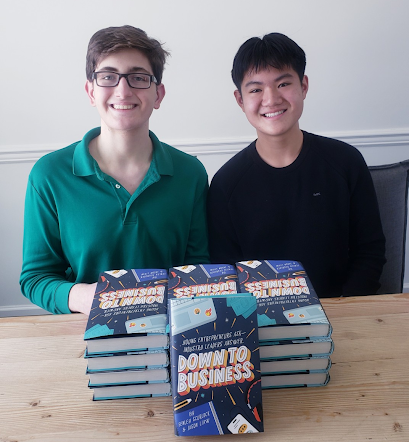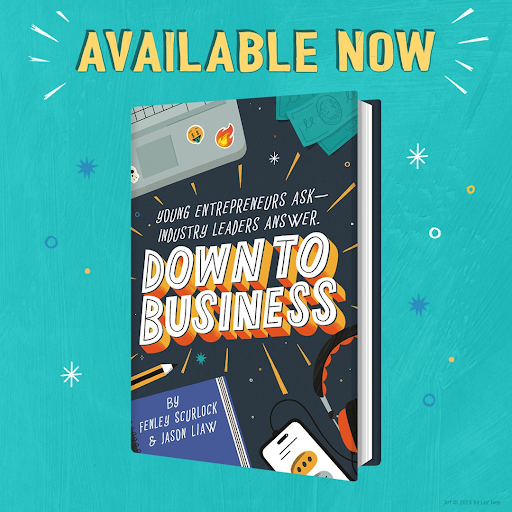“You have a start-up idea but … where do you go from there?” This is the question that Down to Business seeks to answer for young and aspiring entrepreneurs eager to explore the exciting world of business. Published last March, this book offers advice from fifty-one business leaders, some from major organizations like Parachute and IKEA, in the form of Q&As. It is the work of OHS student Fenley Scurlock and his coauthor Jason Liaw, who attends Poolesville High School. Having established his own business while still in middle school, Scurlock has long recognized himself as a young entrepreneur: his writing of the book represents a step toward expanding his passion for business as well as inviting others to take interest in entrepreneurship.
Scurlock began his first business at the age of seven. He sold handcrafted soap products: though simple, this was the main stage of Scurlock’s business career that let him explore his creativity and innovative ideas, which are essential in the realm of business.
“I had a soapmaking kit that I’d found at a store. When I saw antique jell-o molds in an antique store, which I thought would be great soap molds, I came up with the product idea and my business expanded from there,” he says. “Once I had actually gotten started, I think that I really saw that what I was doing was not only enjoyable but really a fundamental life skill, at least in my eyes.”
Scurlock acknowledges his desire to jump into business: “I didn’t want to wait until I was older,” he says. In co-authoring Down to Business, he hopes to provide others with insights and expertise he wishes he had early on.
“Business was something we [Jason and I] thought that everyone should learn in the course of their education, but that kind of lesson wasn’t often out there, so we’d often learned through experience,” Scurlock says. “It worked, but wasn’t the most effective strategy.
“In writing the book, we wanted to provide accessible advice for our generation and the all the generations after, with a focus on things we thought would be relevant as they pursue a career in entrepreneurship potentially, and things the generation is passionate about, including social media, social justice and activism, authenticity, diversity, and so many other key values.”
Writing the book took four years. Beginning the spring of 2021, Scurlock and Liaw continuously wrote and edited drafts. They submitted their finished manuscript to various publishing contracts, eventually securing the Penguin Random House company.

“In the process of getting a publisher, the first step really is getting an agent, so that was really what we were working on to begin with – finding someone to represent us,” Scurlock says. “It did take a long time for them [the publishing company] to respond: publishers accept at a very low rate, like only one percent.”
For the book itself, following their original motivation, Scurlock and Liaw interviewed fifty-one business leaders of companies for entrepreneurship advice applicable, potentially, to their generation and beyond. “We started with people who are local community business owners in our area and people we had connections with. From there, we reached out to companies we admired, from SecZetta to Linkedin, and asked them to speak with us.”
Scurlock recalls that the biggest challenge was settling on meeting times. As an OHS student, he has classes at all hours throughout the day, whereas his coauthor Liaw attends a more traditional school during the day. This left minimal time when they were both free, and there was also the need to accommodate a busy CEO.
The business leaders themselves, however, would respond enthusiastically to an interview request. Scurlock and Liaw received agreements from many of the biggest companies. “I think it was a mutually beneficial thing. From them, we got a person for our book, and from us, they got an opportunity to get some PR themselves, focusing specifically on teaching the generation.”
In the process of writing the book, as in the process of developing a business, Scurlock realized the importance of resilience and developing different entrepreneurial skills. This is a message his book emphasizes. “Writing a book, we found, was very much like starting a small business,” he says. “We had to learn how to contact someone you needed advice from, how to obtain an opportunity, how to move on if you are rejected – a common thing which you have to learn to accept in entrepreneurship – and how to analyze your market, competition, and audience.”

With the publication process complete, Scurlock and Liaw are now engaged in the marketing of their book. They are doing as many book signings, events, and media interviews as they can to advocate the book to wide audiences. They’re also attempting to find potential corporate sponsorships in hopes of finding people who might buy and donate their books to schools, making them accessible for students who might otherwise not be able to get them.
Beyond that, on a personal level, Scurlock is in the process of writing another book. Authoring Down to Business has endowed him with a love of writing and he hopes to be an author someday. Scurlock’s new book, this time, is going to be a fictional novel.

